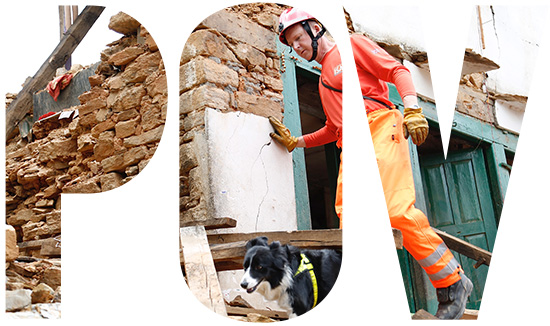POV: Nepal in Crisis
A plea to support grassroots organizations aiding earthquake survivors

Photo by Flickr user UK Department for International Development
The catastrophic 7.8 magnitude earthquake that hit Nepal on April 25 not only claimed the lives of thousands, but wiped out much of the country’s history as well.
Historical monuments and renowned UNESCO World Heritage sites that served as a window to the country’s rich and colorful past, temples and stupas where generations have whispered their faithful prayers, and homes that were passed on from great-grandfathers to their kin to the next in line are now merely a rubble of mud, bricks, and wood. Buried under these ruins of their history were thousands of Nepalis, whose bodies are still being recovered, and the official death toll of 7,500 is expected to rise as search-and-rescue teams obtain access to remote mountain villages.
The international community responded immediately, and millions in aid and donations have been pouring in from all over the world. But because the government’s response has been lackluster and inefficient, hundreds of local youth organizations, made up of students and young professionals who survived the tragedy, have been born out of necessity.
Waiting for powerful nations and organizations to come to the rescue is not an option. Headlines about the tragedy are already vanishing from the front pages of global media, and when another crisis affects another region, the international focus will automatically shift from Nepal, and the deafening cries of the nation will reverberate only within the mountains that guard it.
Instead of letting this happen, the BU community can make a big difference by supporting the grassroots efforts that have sprung up.
There are hundreds of crowdfunding and crowdsourcing drives, one of which I am personally overseeing here. This is a community effort by the many greater Boston Nepali communities to collectively raise funds to aid the grassroots movements that are now mobilizing in the affected areas.
Why my personal interest? I am a native of Nepal. In the aftermath of the earthquake, many of my friends rode their bicycles and motorbikes strapped with medical supplies, food, water, and tents to places outside the Kathmandu valley. In many places, such everyday Samaritans were the first to arrive with any relief. Their efforts meant the difference between life and death. That’s how grave the situation is. Many global Nepali expats and students currently abroad for education and work were equally traumatized when the news broke out, and the feelings of helplessness and despair at the inability to be with their loved ones has invoked in many the desire and the motivation to contribute to the efforts in any way possible. Other established community organizations and NGOs have taken it upon themselves to reach out to areas inaccessible to relief trucks and disaster-relief teams.
Almost all of the global humanitarian organizations are conducting donation campaigns for relief efforts. We at Greater Boston Nepal Earthquake Relief initially thought to channel our collective fundraising efforts through the Red Cross, but upon researching the organization, we realized that not all of the donations that go to the Red Cross or any other organization for Nepal will actually be used in Nepal. Factoring in the overhead costs of such organizations, we decided to funnel our donations instead to support groups that are already on the ground there to ensure that 100 percent of what we raise goes to the people desperate for basic survival needs.
The donation drives have had incredible results; one of them is the Nepal Earthquake Relief Fund, spearheaded by the internationally renowned fashion designer Prabal Gurung, a native of Nepal, which has raised more than $500,000.
What the international community needs to understand is that the process of rehabilitation will take years, because thousands of houses and structures have been obliterated and millions have been displaced and left with almost nothing. Thousands of children who lost their families need to be sheltered, schools and hospitals need to be rebuilt, and millions need a more permanent solution than a tent hanging over their heads. In a nutshell, the whole country needs to be revamped. and that will require millions of dollars before any substantial changes can be achieved.
You have the power to save lives, change communities, and heal a nation in trauma. Every dollar helps, every last one. So please help Nepal as it tries to pick itself up, and help us, or any organization of your choice, to provide relief to those grieving the loss of their loved ones, aid the traumatized as they try and make sense of reality, and heal the nation as it attempts to piece itself together.
Pankaj Khadka (COM’16), from Nepal’s capital, Kathmandu, can be reached at pkhadka@bu.edu. He received a 2015 fellowship from the Pulitzer Center on Crisis Reporting to return to Nepal this summer to examine the effects of mass migration on village life, a project that will include documenting the aftereffects of the earthquake. His family back home, he says, is “traumatized and scared, but they’re alive and well.”
“POV” is an opinion page that provides timely commentaries from students, faculty, and staff on a variety of issues: on-campus, local, state, national, or international. Anyone interested in submitting a piece, which should be about 700 words long, should contact Rich Barlow at barlowr@bu.edu. BU Today reserves the right to reject or edit submissions. The views expressed are solely those of the author and are not intended to represent the views of Boston University.
Comments & Discussion
Boston University moderates comments to facilitate an informed, substantive, civil conversation. Abusive, profane, self-promotional, misleading, incoherent or off-topic comments will be rejected. Moderators are staffed during regular business hours (EST) and can only accept comments written in English. Statistics or facts must include a citation or a link to the citation.